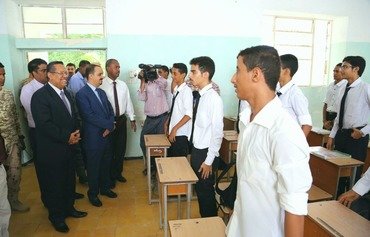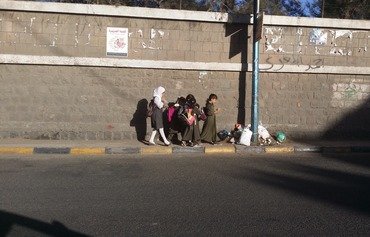Yemen's Ministry of Education is making great efforts to reintegrate the children of families displaced by the conflict into the education system, said Deputy Minister of Education for Girls Ishraq al-Hakimi.
But due to the ongoing war , she said, the ministry faces a number of obstacles in this regard, as a number of educational programmes funded by the World Bank and other donors have been suspended.
In an exclusive interview with Al-Mashareq conducted in her office in Sanaa, al-Hakimi said only a few donor-backed programmes are still going, all of which are working to increase the enrollment of students in general and girls in particular.
Al-Mashareq : What are the main problems male and female students face, particularly displaced students, amid the ongoing war and violence?
Ishraq al-Hakimi : The students actually are dealing with psychological problems as an adverse consequence of the circumstances they experienced during the war and resulting unstable conditions.
These include displacement from [conflict] affected areas to relatively safe areas and mounting cases of poverty and a scarcity of food and medical necessities.
Additionally, the problems we typically face in the girls’ education sector have grown more serious under the current circumstances. This is a consequence of parents preventing their daughters from attending school or their inability to cover the cost of education amid the increasing poverty.
Al-Mashareq : How is the Ministry of Education dealing with these problems?
Al-Hakimi : The Ministry of Education in all sectors, including the girls’ education sector, is making great efforts to address these problems with a range of solutions.
These include emergency education and psychological support programmes to mitigate the psychological effects [of war] on students, as well as training and qualifying teachers on how to deal with the problems their students face.
The problem of parents’ inability to bear the cost burden of education is being dealt with by providing school bags and uniforms to students in the areas affected by the war and in conflict zones.
There also is a school food programme in place that offers assistance to female students in the form of food baskets to encourage parents to enroll them in school.
Al-Mashareq : What are the ministry's plans to get students who drop out of school back into the classroom?
Al-Hakimi : The ministry, and the girls’ education sector in particular, is keen to increase the enrollment rate and prevent student dropout. This is one of its primary objectives.
Amid the extraordinary circumstances in the country, two campaigns have been launched: the back-to-school campaign, and a national campaign to encourage school enrollment by targeting all school-age students, particularly deprived girls, marginalised students, street labourers and children with special needs.
Both campaigns are moving in the same direction, and support each other in order to get male and female students back into the classroom and prevent student dropout.
Furthermore, the ministry's offices have been directed to co-operate with civil society organisations in support of both campaigns, and school administrations in all provinces have been urged to accept and register students.
Administrative offices have been urged to take into account the circumstances of internally displaced persons (IDPs), and co-ordinate to find alternatives to destroyed and damaged schools.
A two-shift system also has been put in place, with morning and evening sessions, to ensure the accommodation of all our children so they are not deprived of education.
Al-Mashareq : What are the most significant plans in place to increase the number of female students enrolled in school?
Al-Hakimi : The sector has strategies and plans in place to increase the number of girls enrolled in school, prevent student dropout and raise public awareness about the importance of community participation in supporting girls' education and improving the quality of education.
We must note here that it was those programmes and activities that were suspended, due to the circumstances of the war and instability of the country. That saw donor organisations and the World Bank stop funding for these programmes and activities, leaving only two running.
The Global Partnership for Education includes three basic components: to encourage enrollment, improve the quality of education and improve the institutional education system through intervention to reduce the gender gap in education. It also gives attention to the provision of education services to children outside of school.
This programme, along with the Qatari Educate a Child (EAC) programme, are implemented in partnership with UNICEF and the School Nutrition Programme.
Al-Mashareq : What are the education support projects and programmes that were suspended on account of the war?
Al-Hakimi : The most important of the programmes and activities that were halted due to suspension of funding from donors include the cash incentive programmes, and scholarship and community grants programme.
The latter includes grants for transportation allowances in areas distant from schools, grants for teacher assistants in mixed schools, a school nutrition programme, and community participation programmes that include training by male and female sociologists.
It also includes the creation of parents’ councils, training and activating them and highlighting their role regarding the education process in general and girls’ education in particular.
Another programme establishes co-ordination councils to support girls’ education and the creation of a network to support girls' education at the national level.
This has been established in 19 provinces, but unfortunately was suspended before it could be established in the remaining provinces, due to the circumstances our country is currently experiencing.

![In an interview with Al-Mashareq, Deputy Minister of Education Ishraq al-Hakimi discusses the state of education in Yemen. [Faisal Darem/Al-Mashareq]](/cnmi_am/images/2016/10/20/6377-Yemen-education-ministry-600_384.jpg)






